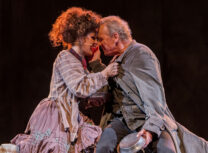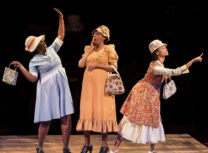SHAKESPEARE’S HENRY V AND THE PSYCHOLOGY OF POWER
By A Noise Within
December 18, 2017
BY DR. MIRANDA JOHNSON-HADDAD
Although most people today tend to think of William Shakespeare as first and foremost a writer of gripping tragedies and delightful comic works, in his own day he was equally well-known for his plays that chronicle the history of the British monarchy, specifically the period that came to be known as the Wars of the Roses. Some of these history plays were among Shakespeare’s very earliest works, suggesting that the young playwright decided to jump-start his career by trying his hand at a form of entertainment that he knew would be popular with his audience. It may seem strange to us today, but Elizabethan playgoers were evidently fascinated by the spectacle of English monarchs struggling to win
and hold onto the throne, to say nothing of all those lively battle scenes. Then again, given the success
of George R.R. Martin’s Game of Thrones books and the wildly popular HBO series, it’s clear that dynastic power struggles and bloody battles are as popular with audiences now as they were over 400 years ago.
Over the course of his career, Shakespeare wrote a total of ten history plays. The most famous of these are the eight that roughly span the years between 1377 (when Richard II ascended to the throne) and 1485, when Henry VII (the grandfather of Elizabeth I, who ruled England for most of Shakespeare’s life) became the first Tudor monarch to govern England. Scholars sometimes break these eight plays down further into two groups of four plays, with each group being known as a “tetralogy.” Interestingly, Shakespeare wrote the first of these tetralogies about those kings who came along during a chronologically later period (that is, Henry VI and Richard III); later in the playwright’s career, when he had become more successful and perhaps therefore more confident in his own writing abilities, he tackled the earlier kings (Richard II, Henry IV and Henry V). These plays that were written later are performed more often than the earlier plays, perhaps due to the extraordinary power and beauty of their language.
Shakespeare was able to make even complex historical events easier to follow (all of those Richards and Henrys and Elizabeths can get very confusing); but the real triumph of these plays lies in how they explore the psychological motives that Shakespeare imagines to have prompted the characters’ actions. In the history plays, Shakespeare is every bit as interested in the thoughts and emotions of his characters
as he is in Hamlet or King Lear, and nowhere is this interest more evident than in Henry V. Shakespeare’s audiences would have been familiar with the character of King Henry V from the earlier plays about his father, King Henry IV, who had acquired the throne through highly questionable means. In the plays that chronicle those events, the future King Henry V shows up as Prince Hal, and he is an utter disappointment to his noble father. Shakespeare depicts the prince as an idle, degenerate young man who spends his days and nights hanging out in taverns, drinking and wasting time with a colorful cast of lowlifes, the most famous of whom is Sir John Falstaff, the “fat knight” who is one of Shakespeare’s most beloved creations. In fact, the historical Prince Hal seems to have been a pretty serious fellow who worked hard to preserve his father’s crown and his own inheritance until he came to the throne himself. But in Shakespeare’s far more dramatically interesting retelling, the careless Prince Hal turns over a new leaf once his father dies, and he becomes a dedicated ruler with a lot to prove to his
skeptical subjects and even to himself.
As King Henry V, the young man settles on the most ambitious possible way of establishing himself as a strong king: he is going to conquer France, England’s great enemy for generations. And conquer it he does, through sheer determination and the power of his own magnificent language, which he frequently uses to rally his troops in the face of seemingly insurmountable odds. The famous St. Crispin’s Day speech, which Henry delivers before the Battle of Agincourt, is so stirring that by the time he finishes speaking, his hopelessly outnumbered soldiers are eager for battle. Not surprisingly, this speech has been replicated in just about every war movie ever made, including, more recently, 300, Harry Potter and the Deathly Hallows Part 2 (in which Neville Longbottom delivers a version of it) to Pacific Rim (in which Idris Elba’s character fires up the troops by declaring that “Today, we are cancelling the apocalypse!”).
It’s no coincidence that several Shakespearean actors on the verge of fame have chosen Henry V as a film project early in their careers—almost as though they, like the young Henry V, had something to prove. Both Laurence Olivier and Kenneth Branagh directed and starred in movie versions, and Tom Hiddleston (when not busy playing Loki in the Thor franchise) starred in the British “Hollow Crown” adaptation of the four history plays as the callow Prince Hal and then the war-like Henry V. Each of these film versions is very much a product of its own time. Olivier’s 1944 interpretation is, among other things, a clear piece of propaganda intended to hearten the British people as World War II
dragged on. Branagh’s 1989 version, on the other hand, is more complex, seeming at times to stress the horrors of war yet at other times to celebrate the camaraderie that fighting men and women experience, as well as the very real thrill of victory. And in “The Hollow Crown” series (2013), the emphasis is very much on the individuals themselves, through the careful use of closeups,
minimal sets and sometimes smaller than expected crowds (Tom Hiddleston’s Henry delivers the St. Crispin’s Day speech to only a handful of his aristocratic
followers, rather than to the entire army).
By watching these film versions carefully and noticing which speeches and actions the actors and directors cut or retain, we can become critics ourselves, of these and of other Shakespeare films and productions. Every production of any Shakespeare play is necessarily an interpretation, and every production reflects what may be an agenda or goal on the part of the director and the actors.
Sometimes that agenda may simply be a particular understanding of the play being performed that director and actors hope to persuade us, the audience, to accept. Other productions, such as Olivier’s film, reflect a broader political or historical agenda. By studying the play’s text and coming to our own understanding of it, we are better able to analyze a given production and decide
for ourselves whether we find it persuasive or not. With Shakespeare, arguably more than with any other playwright, we need to be attentive theatregoers,
because centuries of interpretation have accrued around his works, but also because an air of mystery surrounds him, to the point where “non-experts” may mistakenly believe that they don’t understand the play well enough to even be “allowed” to have an opinion about a given production. But Shakespeare himself would have been appalled by such concerns, for he never would have imagined, much less have wanted, his plays to become the property of scholars alone. He wrote his plays to be performed for the audiences of his own time, and he would doubtless be delighted (though probably also somewhat amazed) that twenty- first century audiences are still being thrilled and moved by his plays.
The history plays may demand that we do a bit more preparation in order to fully appreciate them than do some of the other plays; but they have never stopped
being relevant, because humanity has never ceased debating what kind of person makes for a truly powerful and effective leader. Medieval monarchs did not have
Twitter at their disposal to reach out to their base, but Shakespeare nevertheless does an admirable job of imagining what they may have been like as flesh- and blood people. Happily, he wasn’t limited to 140 (or even 280) characters with which to present these larger-than life individuals in all their complexity, and we should appreciate each and every glorious word of these compelling and still timely plays.
RESOURCES – FURTHER READING
–Peter Saccio, Shakespeare’s English Kings (Oxford University
Press, revised edition, 2000). A clear and entertaining guide to the
complicated history behind Shakespeare’s history plays, written by a
Dartmouth professor.
–Marjorie Garber, Shakespeare After All (Anchor Press, 2005). A
masterfully insightful discussion of all of Shakespeare’s plays by a wellknown
Harvard professor.
RESOURCES — FILM
—Henry V, directed by and starring Laurence Olivier, 1944.
—Henry V, directed by and starring Kenneth Branagh, 1989.
—The Hollow Crown, Parts I and II. Part I (2013), starring Tom
Hiddleston, Ben Whishaw, Jeremy Irons, John Hurt and others,
consists of Richard II, Henry IV Parts I and II, and Henry V. Part II
(2016), starring Benedict Cumberbatch, Judi Dench, Hugh Bonneville,
Sally Hawkins and others, consists of Henry VI Parts I, II, and III, and
Richard III








